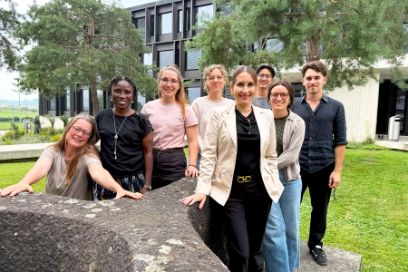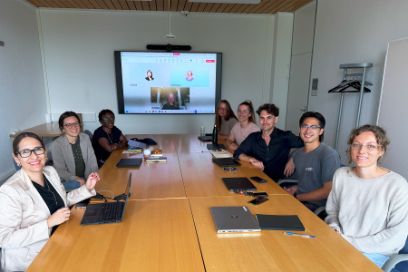- Story
BFH-HAFL at Tropentag 2025
05.09.2025 A group of staff and current and former students will be in Germany for Europe’s leading conference on tropical and subtropical agriculture, natural resource management and rural development.
Chilly Bonn will be overrun by tropical scientists next week.
About 1000 researchers are expected to attend Tropentag 2025 at the University of Bonn from 10–12 September, and 1% of them will be representing HAFL.

What is Tropentag?
Tropentag is the go-to European conference for anyone working on tropical agriculture, forestry, food systems, and rural development, with a strong emphasis on global collaboration and young researchers. The theme this year is “Reconciling land system changes with planetary health”.
Lecturers Prof. Pascale Waelti and Ingrid Fromm will guide the nine current and former HAFL students who’ve been invited to either give oral presentations or present a poster.
The MSc students are Célia Bühler, Valentine Copt, Olayemi Fajimi, Stephan Mabica, Sean Yeo and Quentin à Hauariki and the BSc students are Noemi Hauser, Lea Pfenniger and Héloïse Schmutz.
Back to the beginning
Returning to Bonn for Tropentag 2025 feels like a “full-circle moment” for International Agriculture research associate Ingrid.
“The first time I attended Tropentag was exactly 20 years ago, in 2005 (in Hohenheim), and I presented a poster,” Ingrid said. “The year after, I was invited for an oral presentation, in Bonn, where I talked about my PhD research.
“I’m very pleased to come back to Bonn and present again. It feels surreal that 20 years later I’m actively involved in the field of agricultural research for development, which I’m so grateful for!
“I’ll be talking about smallholder farmers in Burundi and how agroecological innovations are helping them increase farm productivity.”

Reflections from oral presenters
While Ingrid is a seasoned Tropentag attendee, it will be the first time for all the students. MSc students Sean, Quentin and Célia will also give 10-minute oral presentations, while the others have three-minute poster presentations.
“I feel a mix of excitement and nervousness,” Sean said, “but I believe I can deliver a solid presentation that people are able to connect with.
“For me, it’s most important to communicate the methodology we used to co-design our strategy game, to enable better decision-making for natural resource management, mainly in the topic of forestry. It would also be great to shed more light and visibility on my research project RESCuE-2 and how it’s progressing.”
“I’m really excited about the opportunity to present our research to a wider audience beyond my supervisors and colleagues at HAFL,” said Quentin. “It’s the first time I’ve put so much effort into a project, and this feels like a great occasion to showcase what we’ve accomplished.
“This will be my first time presenting at such a large event, and I see it as an exciting challenge. I’m also grateful to be representing a topic I truly enjoyed working on. For now, I’m not feeling nervous, though I suspect that might change as the deadline gets closer.”
Célia’s also feeling a bit nervous about giving her presentation, after being “promoted” from a poster session.
“If I’m being honest, I’m mostly stressed,” Celia said. “A poster would have been fine, but the oral presentation is different to me. I know that this is a privilege, and I’m committed to making the most of it, but I know the audience is very rigorous and scientific.
“The important thing will be to frame my results in a way that is considered, relevant and interesting for this specific audience. It is my first time at a scientific conference, so I also need to learn the codes and expectations of such an event.”
Reflections from poster presenters
For the “poster” group, they’re looking forward to participating in such a large event, too.
“I feel honoured and excited to be a participant,” Olayemi said. “Tropentag is a unique platform to engage with researchers from different parts of the world and being part of it is both a professional milestone and a learning opportunity for me.
“I hope to get constructive feedback on my research and connect with other researchers and scholars. The best outcome for me would be establishing new collaborations and gaining insights that strengthen my work and expand its relevance.”
“At the moment I feel a little nervous thinking about presenting and I don’t really know what to expect,” Noemi said. “For me, it's less about my own presentation and more about what I can take away and learn from others.
“I'm looking forward to many different, interesting presentations about projects from all corners of the world.”
Topics and times
Oral presentations (all on Thursday 11 September)
- Sean Yeo: Breaking the failure cycle: Strategy game design to rethink mangrove restoration.
10:45–11:00. Location: HS 2. - Quentin à Hauariki: Value chain analysis of cover crop seeds to scale agroecology: A case study in Battambang Province, Cambodia.
15:30–15:45. Location: H 2. - Ingrid Fromm: Impact of agroecological innovations on agricultural production and the environment in the foothills of Mumirwa, Burundi.
15:45–16:00. Location: H 2. - Célia Bühler: Closing the loop: Composting coffee co-products for sustainable soil fertility in northern Nicaragua.
15:45–16:00. Location: H 7.
Posters
- Olayemi Fajimi: Cocoa farmers' willingness to adopt DNAFoil for early detection of cocoa swollen shoot virus disease in Ghana.
Thursday 11 September, 8:30–10:00. - Noemi Hauser: From nematode nightmare to yield triumph? Evaluating biological agents' effect on lettuce cultivation in Costa-Rica.
Thursday 11 September, 8:30–10:00. - Pascale Waelti (and Sarah Guidi): From waste to dairy: Enhancing camel milk production with sustainable feed alternatives. (Camilk project)
Thursday 11 September, 8:30–10:00. - Héloïse Schmutz: Agroecological practices in home and kitchen garden for food and nutrition security.
Thursday 11 September, 17:15–18:45. - Lea Pfenniger: Agroecological practices in an indigenous territory: Case study of an Aymaran community in Bolivia.
Friday 12 September, 8:30–10:00. - Gurbir Singh Bhullar: Agroecology and mechanisation on selected congregation farms in Tanzania.
Friday 12 September, 8:30–10:00. - Valentine Copt: A systematic analysis of factors shaping youth participation in agriculture in northern Laos.
Friday 12 September, 8:30–10:00. - Stephan Mabica: EUDR compliance in Ghana’s natural rubber sector and its implications for smallholders.
Friday 12 September, 8:30–10:00.
Find out more
Category: International